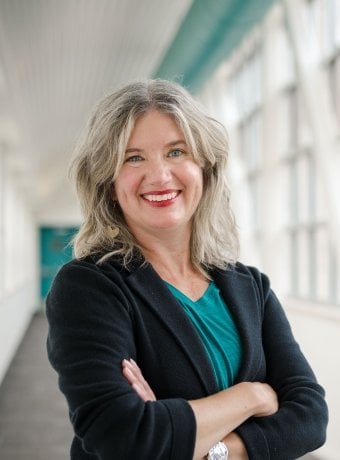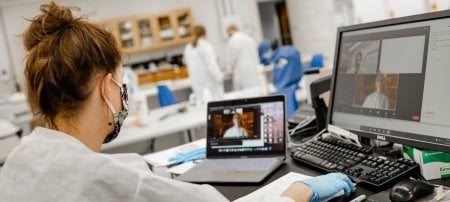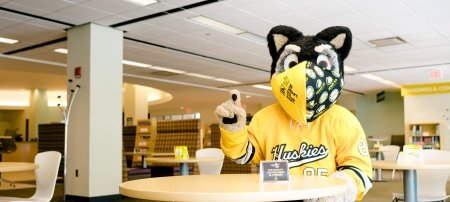The pandemic changed the way we teach. What’s working and what isn’t? Student writer Aemili Lipzinski shares ideas from both sides of the classroom.
COVID has taken so many things from so many people, most notably loved ones and precious time with people we wish we could see again. It’s taken graduation ceremonies and celebrations. It’s taken lunch dates and anniversary dates. It’s taken in-person classes and at-home comfort. It’s taken sanctuary and peace of mind from students, teachers, parents and community members.
Incoming freshmen in college choose between taking classes in person and risking infection or taking classes online and risking isolation. This balance between online and in person is something that one group at Michigan Technological University has been working hard to combat.
About the Researcher
According to Marika Seigel, associate professor of rhetoric and technical communication, “IDEA Hub is really an educational innovation incubator on Tech’s campus. There’s involvement from all units of campus, faculty and staff, and we have some student involvement as well.”
She explains that IDEA Hub’s goal is to create a space where new programs and models of teaching and learning can be launched and experimented with. Between outdated education systems and a rapidly changing world creating more outmodes than jobs, a group with a forward-focus mindset couldn’t come fast enough for the students at Michigan Tech.
IDEA Hub
IDEA Hub is a group of faculty and staff working hard to solve some of the problems inherent in flexible education, not the least of which is an increase in coursework — but they can’t do everything.
In my time at college, I’ve taken a variety of classes from traditional lectures to hands-on workshops to remote, asynchronous classes. Being an English major with reading-heavy coursework, I’m a big fan of online learning that can be done on my own time, but remote learning has put more stress on my schedule than I ever expected. (Based on what I’ve learned, I offer advice for teaching and learning in a pandemic.) Hybrid learning needs a makeover desperately, especially as it’s making moves to change the way students experience college, high school, and even earlier schooling.
While the shift to online learning last spring and this fall wasn’t seamless, it happened far more smoothly than expected. Keeping in-person class values was a priority on campus; IDEA Hub worked alongside department chairs, deans, University pandemic response teams, study groups and the many, many individuals who pulled together remote instruction for the entire University in under a week.
Prior to the pandemic, one of the ways IDEA Hub sought to transform education focused on first-year students integrating into college. They sought solutions to get freshmen involved in college life, participate strongly in class and build a social and support network to aid in the transition from high school teenagers to free young adults. The transition to being fully responsible for oneself can be difficult in the best of situations, with college providing a structured world for that kind of growing up — and the pandemic threw a wrench in more than just graduation plans. When COVID-19 forced school and in-class closures, IDEA Hub and the Jackson Center for Teaching and Learning were on the frontlines, offering a series of workshops that supported faculty, staff and students in their transition to remote learning.
“We realized,” Seigel said, “this was what IDEA Hub could excel at: helping people adapt to these uncertain, changing circumstances.”
The IDEA Hub Vision
What if students pursued missions instead of majors? What if barriers to interdisciplinary collaboration disappeared? What if, instead of helping students to “learn about,” we helped them “learn to become?” What if we taught them how to fail mindfully? Let’s reimagine the University. Re-create the future. Revolutionize higher education. Together. That’s IDEA Hub, founded in 2019 as a result of the Tech Forward Education for the 21st Century Initiative led by Lorelle Meadows and Mary Raber.
Feedback, Feedforward
The teachers and professors experiencing the most success are the creative ones. Take how David Flaspohler is adapting his field ornithology course or how Brigitte Morin shifts her approach based on class size. The solution to the problem of too much work or too little interaction is not to continue to try methods that don’t work. It’s too easy to clock out of a Zoom call. It’s too easy to regurgitate information in a response paper or discussion board. It doesn’t foster a productive learning environment.
IDEA Hub is not just for faculty: Its main concern is adapting learning environments for students. Students are the ones who are learning and operating the most in this strange education flex, and it’s their input that can help change the direction of future remote and online or hybrid classes.
The brainstorming sessions or panels offered by IDEA Hub are available online, and I want to end with a reminder that professors do read the student evaluations at the end of the semester and, if the reviews are sound and the advice helpful, they take into account what their students said did and did not work. The end-of-semester evaluations are one of the best ways for students to have a direct impact on the evolution of learning for a variety of classes.
We can start off the semester by thinking about the end: What works right now? A new semester is a new chance to change up or improve old habits, from small-scale personal ventures to large-scale classroom bettering. Personally, the spring semester is always a lot harder for me than the fall semester, so I have to really change the way I study and prioritize things, including my communication and study skills. Looking back is one way that we can move forward.
Feedback means we reflect on the past to improve the present and future; feedforward means we lean into the potential of the future. The pandemic sucks. Remote learning is hard. But we have the opportunity to make the most of a bad situation. I know that sounds hopeful and optimistic and that not everything is perfect right now, but working out the kinks in the plan now will only lead to improvement for future students and professors alike. Your input is valuable and valid.
Michigan Technological University is an R1 public research university founded in 1885 in Houghton, and is home to nearly 7,500 students from more than 60 countries around the world. Consistently ranked among the best universities in the country for return on investment, Michigan's flagship technological university offers more than 120 undergraduate and graduate degree programs in science and technology, engineering, computing, forestry, business, health professions, humanities, mathematics, social sciences, and the arts. The rural campus is situated just miles from Lake Superior in Michigan's Upper Peninsula, offering year-round opportunities for outdoor adventure.







Comments